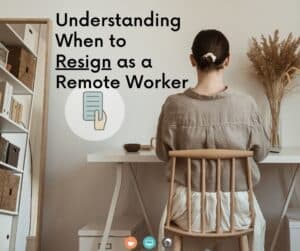Understanding When to Resign as a Remote Worker

While remote work offers flexibility and freedom, there may come a time when you realize that it’s time to resign from your remote position. Recognizing when it’s time to move on is essential for your career growth and overall well-being as a remote worker. If you are experiencing the issues and/or feelings below, then it’s time to consider moving onto your next opportunity:
Feeling Constantly Disconnected from Your Team
When you begin to notice that you’re out of the loop on projects or team updates, it’s a red flag that shouldn’t be ignored. Being remote shouldn’t mean feeling isolated or sidelined. This disconnect can not only affect your morale but also your productivity and enthusiasm for the job. Efforts to enhance communication, such as scheduling regular check-ins or leveraging collaboration tools, are vital. However, if these attempts don’t bridge the gap and you continue to feel like an outsider within your own team, it may indicate that your current remote position isn’t facilitating the level of engagement and teamwork you need to thrive. This realization could signify that exploring new opportunities where you can feel a stronger sense of community and connection is the next step in your career journey.
Your Growth Opportunities Have Plateaued
One clear signal that it’s time to consider resigning from your remote role is when you’re no longer presented with opportunities for advancement or learning. The unique nature of remote work might obscure your accomplishments and contributions from decision-makers, leading to a stagnation in career progression. In such scenarios, you may find yourself performing the same tasks repetitively without the prospect of moving up the career ladder or expanding your skill set. This lack of growth can contribute to a feeling of being stuck, which is detrimental to both your professional development and personal fulfillment. If after expressing your desire for more responsibilities or different projects, the situation remains unchanged, it could be an indication that the organization doesn’t have the capacity or willingness to support your career trajectory as a remote employee. It’s important to be in a role where you’re continuously challenged and learning, and if your current position ceases to offer that, seeking new opportunities elsewhere might be the best course of action for your career.
Work-Life Balance Is Becoming Work-Life Blur
For remote workers, delineating between professional duties and personal time can become increasingly challenging. The convenience of working from anywhere sometimes translates into an inability to switch off from work mode, leading to the blurring of boundaries between work and life. This phenomenon is particularly concerning if your living space doubles as your workspace, making it difficult to physically and mentally separate the two spheres. When work tasks begin to invade your personal time, causing you to routinely extend your work hours well into your supposed downtime, it’s a signal that your current remote work situation may be unsustainable. Such imbalance not only affects your mental and physical health but also your relationships and overall quality of life. Continuous overwork and the inability to disconnect can lead to burnout, a state of emotional, physical, and mental exhaustion caused by prolonged and excessive stress. Recognizing this pattern is critical. If implementing strategies to reclaim your work-life balance proves ineffective — such as setting stricter work hours, designating a specific area in your home for work, or discussing workload adjustments with your manager — it might be indicative of a deeper issue within the role or organization. In these instances, considering a resignation could be a necessary step towards restoring balance and safeguarding your well-being.
You’re Experiencing a Decline in Job Satisfaction
When your days start blending into a monotonous cycle of uninspiring tasks and you no longer feel the joy or enthusiasm for your work that you once did, it might be indicative of a deeper issue with job satisfaction. This dissatisfaction can manifest as a persistent sense of dread towards daily duties or a noticeable indifference towards achievements that would have previously excited you. For remote workers, the absence of a physical office environment might exacerbate these feelings, as the typical sources of motivation — like face-to-face interactions with colleagues or the tangible atmosphere of a bustling workspace — are not present. It’s essential to listen to these feelings; they serve as critical indicators that your current position may not be fulfilling your career needs or personal aspirations anymore. Engagement with work is key to not only productivity but also to maintaining a positive state of mental health. When you notice a significant and lasting dip in how satisfied you feel with your work, it’s a clear signal to reassess your career path. Exploring new roles that promise more engaging and meaningful work could reignite your passion and drive, steering your career towards a more satisfying future.
The Company’s Vision and Your Personal Values No Longer Align
When your core values start clashing with the ethos or direction of the company you’re working for, it’s a significant indicator that resignation might be the right step forward. A misalignment with the company’s vision can lead to a profound sense of discomfort and ethical conflict, making it increasingly difficult to fulfill your duties with genuine enthusiasm and integrity. Feeling like you’re compromising your values for the sake of employment is neither sustainable nor fulfilling. Instead, seeking a role that aligns with your personal beliefs and professional aspirations can provide a renewed sense of purpose and satisfaction.
What are some signs you have come to recognize that it is time to move onto a different job? Share them with our audience so that we can all learn together!
